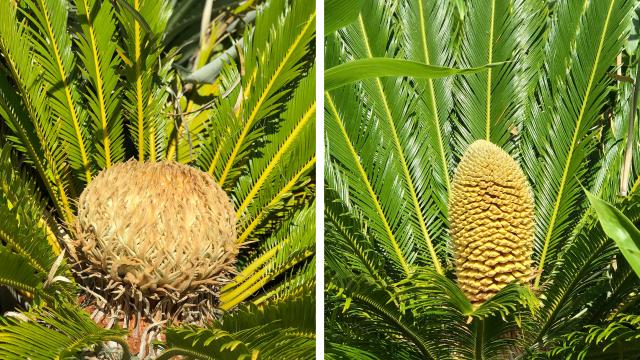Cycads are palm-tree like plants that dominated the Earth’s landscape some 280 million years ago when the continents were smashed up into Pangea. Back then, the planet was going through global warming due to increased carbon dioxide levels from natural processes, which allowed plants called cycads to flourish around the world.
They still grow throughout parts of the world today but only reproduce in very warm climates. Now, human-induced climate change is bringing back the flowering of cycads — or Cycas revoluta if you wanna get formal — to parts of the world it hasn’t been seen in a many millennia.
The Ventnor Botanic Garden on England’s Isle of Wight announced the appearance of female and male cycad cones earlier this month. This is the first time the garden has recorded a female cone appearing naturally in the UK A male cone appeared seven years ago — but they’ve never flowered in the UK at the same time since humans have been around to capture the moment. Officials point to climate change as the explanation.
“For us, it’s the plants telling us about climate change,” John Curtis, the director of the Ventnor Botanic Garden, told Gizmodo. “For a plant to effectively try and reproduce, conditions have to be correct. And that’s not one hot day. That’s a drift of climate for more than a year, a full growing cycle.”
Some 60 million years ago, this wouldn’t be a big deal. Cycads are believed to have still flowered then in what is today Northwest Europe. Visitors may find these cones sprouting outside a Buddhist temple in Nepal today, but in the UK? No way. Curtis called this event “extraordinary.”
These cones growing there today signals that the climate crisis may be influencing ancient plants in lands they haven’t seen in some time. Curtis believes this is a result of local averages temperatures rising. Last July was literally the world’s hottest month and records were set in a slew of European cities, including the UK. All that heat was good for the cycads.
“Conditions must be improving or triggering for us to get a male and a female at the same time,” Curtis told Gizmodo. “For us, it’s just a symptom of the changing climate. It’s the plants talking to us and responding to these favourable conditions.”
Who knows what’ll sprout where next. For now, botanists are enjoying this wonder. Those at the Ventnor Botanic Gardens plan to manually pollinate the plants to produce some seed in what will be another historic event for the record books.
